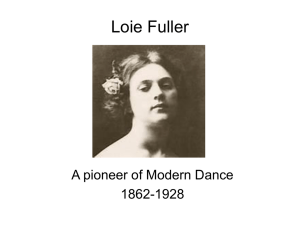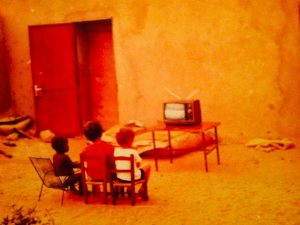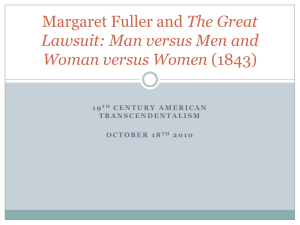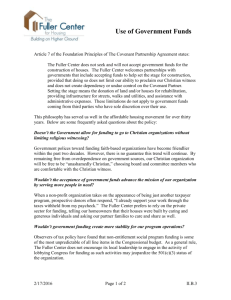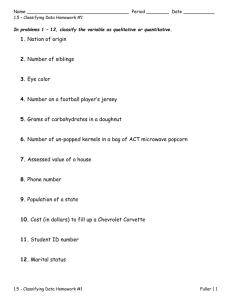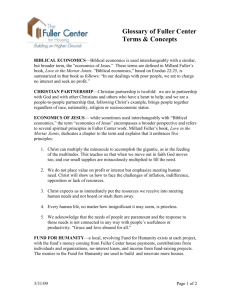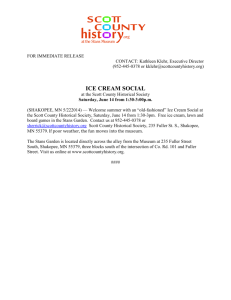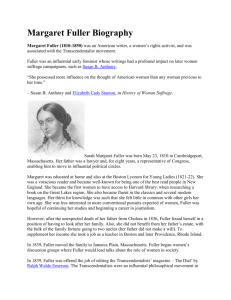Natural/Environmental_Antebellum/Slavery: Margaret Fuller
advertisement
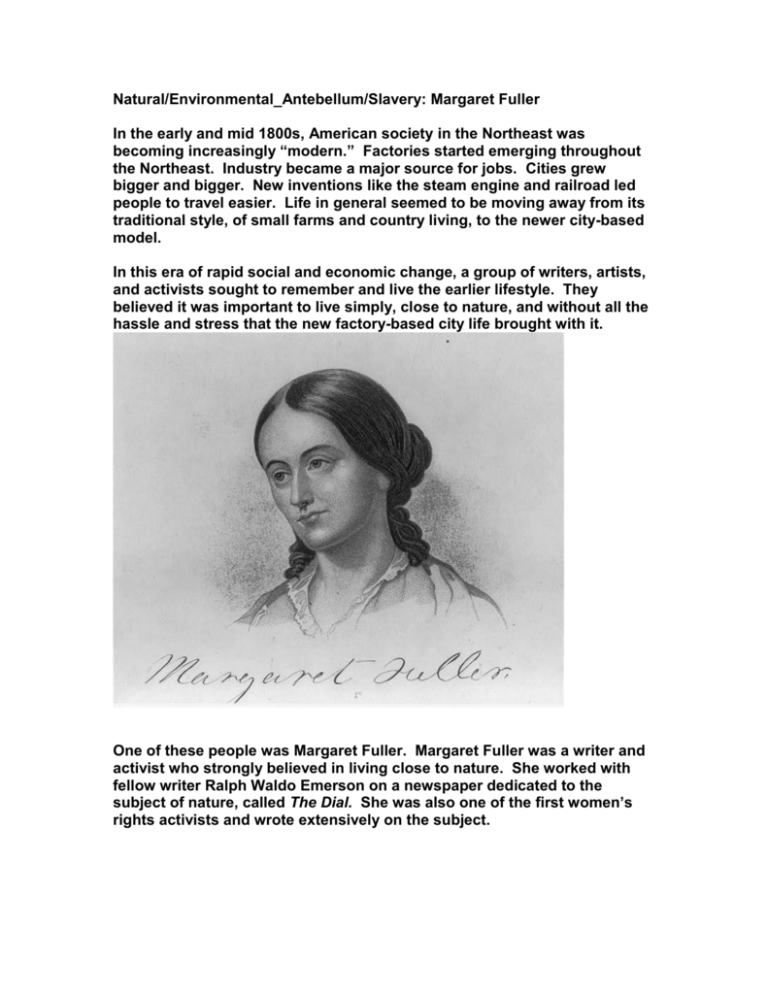
Natural/Environmental_Antebellum/Slavery: Margaret Fuller In the early and mid 1800s, American society in the Northeast was becoming increasingly “modern.” Factories started emerging throughout the Northeast. Industry became a major source for jobs. Cities grew bigger and bigger. New inventions like the steam engine and railroad led people to travel easier. Life in general seemed to be moving away from its traditional style, of small farms and country living, to the newer city-based model. In this era of rapid social and economic change, a group of writers, artists, and activists sought to remember and live the earlier lifestyle. They believed it was important to live simply, close to nature, and without all the hassle and stress that the new factory-based city life brought with it. One of these people was Margaret Fuller. Margaret Fuller was a writer and activist who strongly believed in living close to nature. She worked with fellow writer Ralph Waldo Emerson on a newspaper dedicated to the subject of nature, called The Dial. She was also one of the first women’s rights activists and wrote extensively on the subject. PREVIOUS NEXT ITEM LIST NEW SEARCH American Women: A Gateway to Library of Congress Resources for the Study of Women's History and Culture in the United States Margaret Fuller. CREATED/PUBLISHED [between 1840 and 1880] SUMMARY Margaret Fuller, head-and-shoulders portrait, facing left. NOTES Published in: American women : a Library of Congress guide for the study of women's history and culture in the United States / edited by Sheridan Harvey ... [et al.]. Washington : Library of Congress, 2001, p. 47. SUBJECTS Fuller, Margaret,--1810-1850. Portrait prints--1840-1880. Engravings--1840-1880. MEDIUM 1 print : engraving. CALL NUMBER BIOG FILE - Fuller, Margaret, 1810-1850 (Marchioness Ossoli) [item] REPRODUCTION NUMBER LC-USZ62-47039 DLC (b&w film copy neg.) SPECIAL TERMS OF USE No known restrictions on publication. REPOSITORY Library of Congress Prints and Photographs Division Washington, D.C. 20540 USA DIGITAL ID ( b&w film copy neg. ) cph 3a47196 http://hdl.loc.gov/loc.pnp/cph.3a47196 http://memory.loc.gov/cgibin/ampage?collId=lhbum&fileName=01714//lhbum01714.db&recNum=12 This is a page from one of Margaret Fuller’s writings on nature, Summer on the Lakes. In the text Fuller portrays an idealized view of nature, which she lauds as being an edenic bastion of purity. She talks of the “buildings” around Niagara Falls, and though others had castigated their presence, Fuller believes that the strength of nature’s beauty is enough to “swallow up all such objects.” Her glowing praise of nature is characteristic of the other transcendentalists of the time. PREVIOUS NEXT ITEM LIST NEW SEARCH Pioneering the Upper Midwest: Books from Michigan, Minnesota, and Wisconsin, ca. 1820-1910 Summer on the Lakes, in 1843. By S.M. Fuller. Ossoli, Sarah Margaret Fuller, marchesa d', 1810-1850. CREATED/PUBLISHED Boston, C. C. Little and J. Brown; New York, C. S. Francis and company, 1844. SUMMARY Sarah Margaret Fuller Ossoli (1810-1850), better known as Margaret Fuller, was a writer, editor, translator, early feminist thinker, critic, and social reformer who was associated with the Transcendentalist movement in New England. This is her introspective account of a trip to the Great Lakes region in 1843. Organized as a series of travel episodes interspersed with literary and social commentary, the work displays a style common to the portfolios, sketch books, and commonplace books kept by educated nineteenth-century women. In addition to her own thoughts about natural landscapes and human encounters, Fuller includes stories, legends, allegorical dialogues, poems, and excerpts from the works of other authors. When she traveled to the Midwest, Fuller was exhausted by her work as editor of the Dial, the Transcendentalist journal she edited with Ralph Waldo Emerson. Accompanied during part of the journey by her friends James Clarke and Sarah Clarke, who created the book's etchings, Fuller traveled by train, steamboat, carriage, and on foot in a circle from Niagara Falls north to Mackinac Island and Sault Ste. Marie, west to Milwaukee, south to Pawpaw, Illinois, and back to Buffalo. Fuller discusses Chicago in some detail, and laments the unjust treatment of Native Americans. She comments on the difficulties of pioneer life for women and on the degradation of the region's beautiful and exhilarating natural environment. She speaks favorably about the British-American agrarian visionary, Morris Birbeck, and includes a short story about an old school friend, Mariana, who dies because her active mind cannot adapt to the restrictive codes of behavior prescribed for the era's elite women. SUBJECTS Great Lakes--Description and travel. Northwest, Old--Description and travel. CALL NUMBER F551 .O84 DIGITAL ID lhbum 01714 http://memory.loc.gov/cgibin/query/r?ammem/lhbumbib:@field(NUMBER+@band(lhbum+01714)) http://memory.loc.gov/cgibin/ampage?collId=lhbum&fileName=01714/lhbum01714.db&recNum=68 In another section of Summer on the Lakes, Fuller writes about women settlers. She explains the differentiation among normalized gender roles and identifies various hardships women settlers faced in the journey westward. PREVIOUS NEXT ITEM LIST NEW SEARCH Pioneering the Upper Midwest: Books from Michigan, Minnesota, and Wisconsin, ca. 1820-1910 Summer on the Lakes, in 1843. By S.M. Fuller. Ossoli, Sarah Margaret Fuller, marchesa d', 1810-1850. CREATED/PUBLISHED Boston, C. C. Little and J. Brown; New York, C. S. Francis and company, 1844. SUMMARY Sarah Margaret Fuller Ossoli (1810-1850), better known as Margaret Fuller, was a writer, editor, translator, early feminist thinker, critic, and social reformer who was associated with the Transcendentalist movement in New England. This is her introspective account of a trip to the Great Lakes region in 1843. Organized as a series of travel episodes interspersed with literary and social commentary, the work displays a style common to the portfolios, sketch books, and commonplace books kept by educated nineteenth-century women. In addition to her own thoughts about natural landscapes and human encounters, Fuller includes stories, legends, allegorical dialogues, poems, and excerpts from the works of other authors. When she traveled to the Midwest, Fuller was exhausted by her work as editor of the Dial, the Transcendentalist journal she edited with Ralph Waldo Emerson. Accompanied during part of the journey by her friends James Clarke and Sarah Clarke, who created the book's etchings, Fuller traveled by train, steamboat, carriage, and on foot in a circle from Niagara Falls north to Mackinac Island and Sault Ste. Marie, west to Milwaukee, south to Pawpaw, Illinois, and back to Buffalo. Fuller discusses Chicago in some detail, and laments the unjust treatment of Native Americans. She comments on the difficulties of pioneer life for women and on the degradation of the region's beautiful and exhilarating natural environment. She speaks favorably about the British-American agrarian visionary, Morris Birbeck, and includes a short story about an old school friend, Mariana, who dies because her active mind cannot adapt to the restrictive codes of behavior prescribed for the era's elite women. SUBJECTS Great Lakes--Description and travel. Northwest, Old--Description and travel. CALL NUMBER F551 .O84 DIGITAL ID lhbum 01714 http://memory.loc.gov/cgibin/query/r?ammem/lhbumbib:@field(NUMBER+@band(lhbum+01714)) In the 1830s, Lowell, Massachusetts became one of the earliest factory towns in America. Using the local river water as a power source, many mills emerged in the town to produce textiles. Many other towns in the Northeast were built using Lowell as a model for the new factory-based model of a city. Search Results The Library of Congress > American Memory Home > Search Results Item 8 of 180 for lowell mill Back to Results list Previous Item | Next Item Photographs from the Detroit Publishing Company, 1880-1920 Item Title [Lowell, Mass., mills on Merrimack River]. Created/Published [between 1900 and 1910] Notes Title from jacket. "4228" on negative. Detroit Publishing Co. no. 034904. Gift; State Historical Society of Colorado; 1949. Subjects Rivers. Industrial facilities. United States--Massachusetts--Lowell. United States--Massachusetts--Merrimack River. Dry plate negatives. Related Names Detroit Publishing Co., publisher. Medium 1 negative : glass ; 8 x 10 in. Call Number LC-D4-34904 <p&p> </p&p> REPRODUCTION NUMBER LC-D4-34904 DLC (b&w glass neg.) Part of Detroit Publishing Company Photograph Collection Repository Library of Congress Prints and Photographs Division Washington, D.C. 20540 USA Digital ID (digital file from intermediary roll film) det 4a18323 http://hdl.loc.gov/loc.pnp/det.4a18323 Margaret Fuller was born in Cambridge, Massachusetts in this house. Her and many other activists from the early and mid 1800s were from the Northeast. Fuller grew up as the initial wave of industrialization swept through places like Lowell in Massachusetts. Search Results The Library of Congress > American Memory Home > Search Results Item 9 of 367 for margaret fuller Back to Results list Previous Item | Next Item Photographs from the Detroit Publishing Company, 1880-1920 Click on picture for larger image, full item, or more versions [Rights and Reproductions] Item Title Margaret Fuller House [i.e. Brattle House], Cambridge, Mass.. Created/Published c[between 1910 and 1920] Notes Detroit Publishing Co. no. 072347. Gift; State Historical Society of Colorado; 1949. Subjects Fuller, Margaret,--1810-1850--Homes & haunts. Dwellings. United States--Massachusetts--Cambridge. Dry plate negatives. Related Names Detroit Publishing Co., copyright claimant, publisher. Medium 1 negative : glass ; 8 x 10 in. Call Number LC-D4-72347 <p&p> </p&p> REPRODUCTION NUMBER LC-D4-72347 DLC (b&w glass neg.) Part of Detroit Publishing Company Photograph Collection Repository Library of Congress Prints and Photographs Division Washington, D.C. 20540 USA Digital ID (digital file from intermediary roll film) det 4a24045 http://hdl.loc.gov/loc.pnp/det.4a24045
